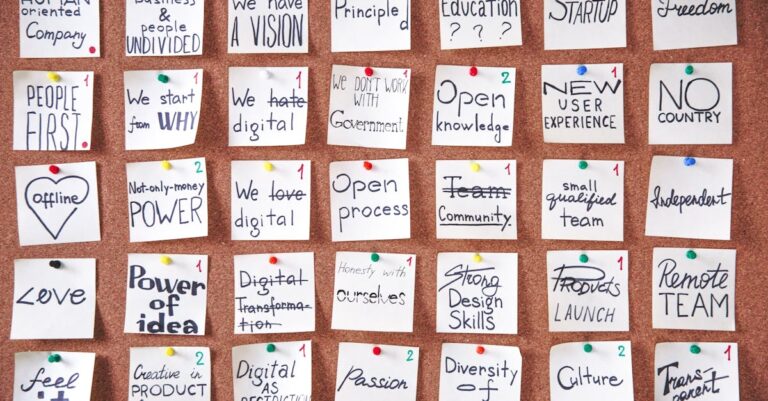In today’s fast-paced world, hustle culture is the new normal. It’s that relentless drive to grind harder, work longer, and chase success like a dog chasing its tail. But is this non-stop hustle really the key to happiness, or just a recipe for burnout? As people juggle multiple jobs, side hustles, and an overflowing to-do list, the line between ambition and exhaustion blurs.
While some may wear their overwork like a badge of honor, others are starting to question the sanity of it all. Is the hustle worth the toll it takes on mental health and personal relationships? This article dives into the highs and lows of hustle culture, exploring why it’s time to rethink our definition of success and maybe even take a nap instead. After all, who knew that productivity could come with a side of humor and a dash of sanity?
Table of Contents
ToggleUnderstanding Hustle Culture
Hustle culture embodies an obsession with hard work and relentless ambition. This phenomenon influences society’s attitudes toward success and productivity.
Definition of Hustle Culture
Hustle culture refers to the mindset that glorifies working long hours and prioritizing career achievements above personal well-being. This belief system often equates self-worth with professional accomplishments. It encourages individuals to constantly strive for more, pushing the boundaries of what is considered normal work-life balance. The overwhelming drive for success fosters a competitive environment where downtime feels unproductive. Individuals engaged in hustle culture often chase constant validation through their work.
Historical Context
Hustle culture’s roots trace back to the industrial revolution, where hard work represented a path to the American dream. The shift from agrarian to industrial society encouraged individuals to dedicate themselves fully to their jobs. Over the decades, corporate America emphasized productivity as key to prosperity. With technology advancements, access to work grew, enabling longer hours and further solidifying the hustle mentality. Social media’s rise amplified this culture by showcasing constant achievement. The continuous cycle of comparison fuels the pressure to outperform peers.
The Impact of Hustle Culture

Hustle culture significantly shapes personal and professional lives today. Examining its positive and negative effects reveals a complex landscape.
Positive Aspects
Hustle culture can inspire ambition and drive. For many individuals, this mindset fosters a strong work ethic that leads to significant career advancements. Achievers often report increased motivation to pursue goals, leading to a sense of accomplishment. Networking opportunities frequently arise from a hustle-focused environment, creating valuable connections among like-minded professionals. Enhanced resilience develops as individuals navigate challenges, ultimately empowering them to overcome obstacles and strive for success.
Negative Consequences
Hustle culture results in concerning negative consequences. Chronic stress emerges due to overwhelming workloads, significantly affecting mental health. Individuals often experience burnout, making productivity unsustainable in the long term. Personal relationships suffer when excessive working hours take precedence over quality time with loved ones. Reduced physical health occurs as self-care routines get neglected, leading to serious issues like anxiety and depression. Realization of these detrimental effects prompts many to reconsider the true cost of relentless ambition.
Hustle Culture in the Workplace
Hustle culture permeates the workplace, pushing employees to prioritize career over well-being. This shift has led to significant challenges in maintaining a healthy work-life balance.
Work-Life Balance Challenges
Striking a balance between personal and professional responsibilities remains a struggle for many. With increased demands, individuals often find themselves working longer hours. The expectation to respond to emails after hours intensifies pressure. Additionally, team environments fuel competition, leading to a culture where downtime is frowned upon. Employees frequently sacrifice personal time for work tasks, resulting in stress and diminished quality of life. Organizations that fail to address work-life balance may see decreased morale and productivity among their teams. Emphasizing balance can enhance overall workplace satisfaction and efficiency.
Employee Burnout
Burnout emerges as a significant concern tied to hustle culture. Feelings of exhaustion and disengagement describe the experiences of many workers under this relentless pressure. Statistics indicate that up to 77% of employees report experiencing burnout at their current jobs. This condition can stem from unrealistic workloads and constant connectivity. Individuals may struggle with mental fatigue, manifesting in reduced job performance. Serious health issues can follow, including anxiety and depression. Employers who recognize these signs can implement strategies to mitigate burnout, fostering a healthier workplace environment. Regular breaks and flexible work arrangements can help rejuvenate employees, contributing to long-term success.
Societal Perceptions of Hustle Culture
Society’s view of hustle culture is complex, shaped significantly by influencers and the rise of social media.
Influencers and Social Media
Influencers often promote a relentless work ethic on social platforms, showcasing their achievements and productivity. Many individuals feel pressured to conform to this image of constant activity, equating success with perpetual hustle. This portrayal glamorizes overwork while minimizing the importance of rest and self-care. Data shows that 77% of employees experience burnout from unrealistic workloads, highlighting the critical need for balance. Engagement metrics on social media validate this behavior, as users frequently seek content that reinforces hustle culture ideals.
Shifts in Public Opinion
Recently, public sentiment has begun to shift regarding hustle culture. Growing awareness of mental health issues has led many to question the sustainability of such a fast-paced lifestyle. Individuals increasingly value self-care and work-life balance, recognizing the need for a healthier approach to productivity. Conversations around burnout now prompt discussions about achievable goals and authentic well-being. Company leaders notice this change and explore policies that accommodate flexible schedules and promote employee wellness, thus creating a more supportive work environment.
Hustle culture has undeniably shaped modern society’s approach to work and success. While ambition and hard work can drive progress and achievement, the toll on mental health and personal relationships cannot be overlooked. As more individuals recognize the importance of balance and self-care, a shift towards healthier productivity practices is emerging. This new perspective encourages embracing downtime and reevaluating what success truly means. By fostering environments that prioritize well-being over constant hustle, both individuals and organizations can cultivate a more sustainable approach to achieving their goals. Ultimately, it’s about finding harmony between ambition and personal fulfillment.



